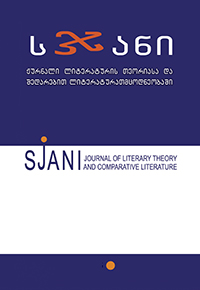მიხეილ ჯავახიშვილის თხზულებათა აუდიოვიზუალური ინტერპრეტაციები
Interpretations of Mikheil Javakhishvili’s Writings in Visual Arts, Theatre and Film
Author(s): Lela TsiphuriaSubject(s): Cultural Essay, Political Essay, Societal Essay
Published by: ლიტერატურის ინსტიტუტის გამომცემლობა
Keywords: “Kvachi Kvachantiradze”; “Jaqo’s Dispossessed”; interpretation; audio-visual, Akhmeteli; “Arsena”.
Summary/Abstract: The article offers an analysis of films and theatrical performances based on the works by remarkable Georgian prose writer Mikheil Javakhishvili, and namely theatrical performances and the film projects made while his lifetime. The main topics raised by the article are related with the contrasts and/or unities among the literary/verbal and fi lm/theatrical ways of expression: was it possible to fully transpose the messages from literary texts into fi lms and theatrical performances; how complete could be the understanding of artistic meaning of Javakhishvili’s literary works in the time of Soviet ideology domination; and was it possible to express that meaning publicly through fi lm and theatre? Mikheil Javakhishvili was thoroughgoing in his attempts of resisting to the Bolshevik regime and disclosing its evil nature. He was achieving these goals through developing allegoric artistic methods, which made his novels acceptable for publishing even under the strict Soviet censorship. However, it was another diffi cult task to re-create the meaning of literary texts through adequate theater and fi lm interpretations. The article discusses the success and/or failure of fi lm/theatre directors while achieving these goals, and also the cases when Mikheil Javakhishvili’s author’s rights were neglected while staging his texts. In the first decades of the 20th century Georgian literature, as well as theatre and visual art, was the part of Western cultural context. All major cultural tendencies of Modernist European culture were refl ected and recalled in Georgian culture. Mikhail Javakhishvili was also participating in this process. He has been famous in Georgia since 1903, when his first story Chanchura was published. However, after the Sovietization of the country in 1921, he was quite often criticized and morally persecuted by Soviets-biased literary critics. Through analyzing main messages of his literary works, it’s seems logical that his professional and personal life was not that easy in Soviet times, and this ended in 1937, within the Great Soviet Purge, with his execution by the Soviets.
Journal: სჯანი
- Issue Year: 2011
- Issue No: 12
- Page Range: 226-236
- Page Count: 11
- Language: Georgian

